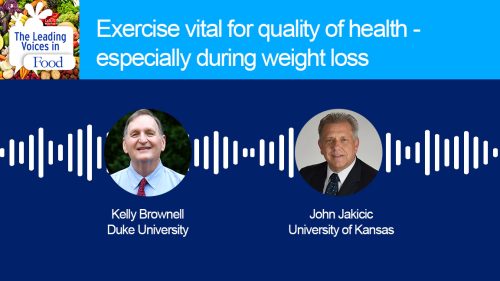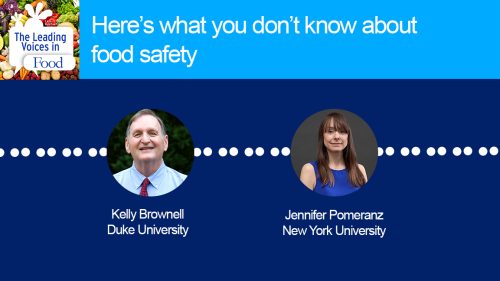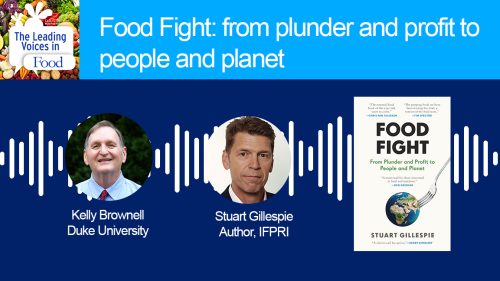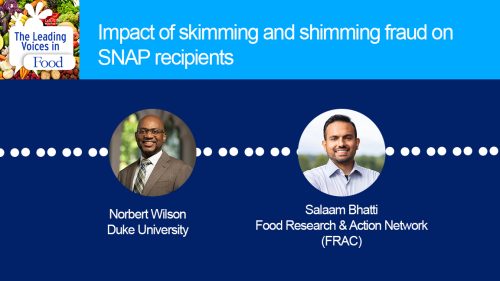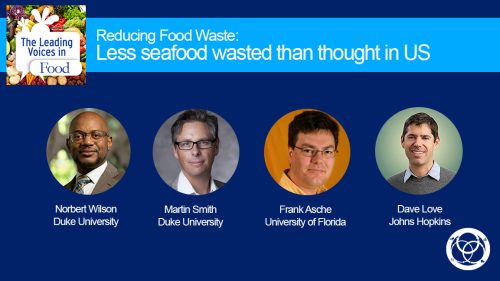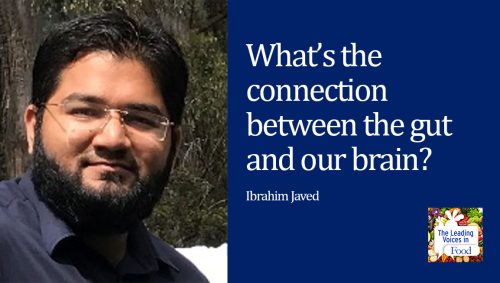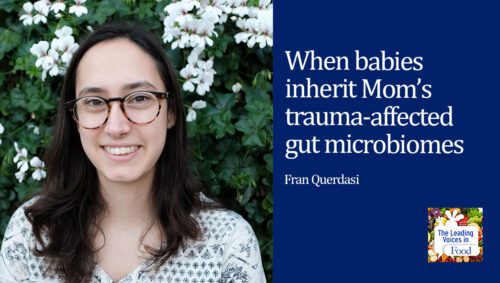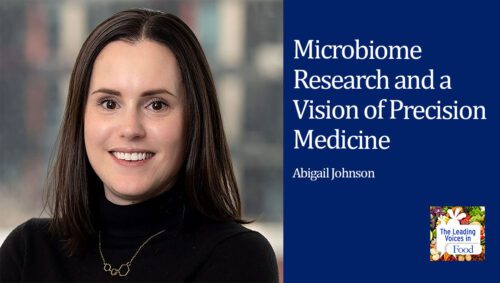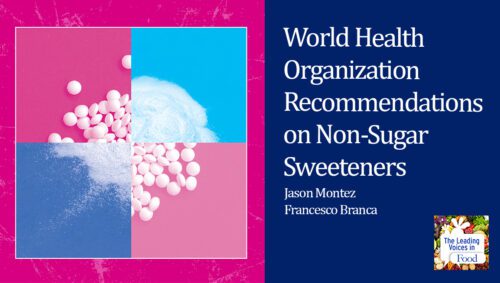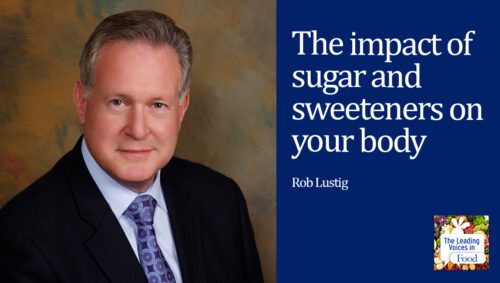The Leading Voices in Food
E210: Clinical Trial Evidence: Metabolic Effect of Sweeteners
Sugar replacements, known generally as artificial sweeteners or non-nutritive sweeteners, have been in the news a lot. Rising concerns exist about safety and the effects of the sweeteners on many key features of health, including the microbiome. We need the help of talented scientists to sort through this complex web of information. Today’s guest, Professor Eran Elinav, has done some of the seminal research in this area. He’s an expert on systems immunology at the Weizmann Institute of Science in Israel.
Subscribe: Apple Podcasts | TuneIN | YouTube Music | SoundCloud | PocketCasts | Radio Public
Tags: Diet & Nutrition | Food Policy | Food Safety & Food Defense | Microbiome | Zero Calorie Sweeteners |

Eran Elinav is an Israeli immunologist and microbiota researcher at the Weizmann Institute of Science and the German Cancer Research Centres. He is an international scholar at the Howard Hughes Medical Institute and the Bill & Melinda Gates Foundation and a senior fellow of the Canadian Institute for Advance Research. Elinav studies the molecular basis of host-microbiota interactions, and their effects of diet, environmental factors, immune function and host genetics on the intestinal microbiome and associated multi-factorial metabolic, inflammatory malignant and neurogenerative disease. His most-cited papers have more than 2,000 cites each. Elinav developed precision microbiota interventions, including Personalized Nutrition, Precision Probiotics, small molecule ″postbiotics″, Phage Therapy, autologous fecal microbiome transplantation, Vaginal Microbiome Transplantation and gut epithelial interventions.
Interview Summary
So back in 2014, you and your colleagues published a study in the prestigious journal Nature showing that sweeteners could induce glucose intolerance – a highly concerning finding, What’s more, they did so by changing the microbiome. Would you tell us a little bit more about this study and what subsequent researchers found.
In the study that published in Nature back in 2014, we explored the consumption of several kinds of artificial sweeteners when administered to mice. We wanted to ask a very simple but important question – are dose formulations of hypersweet compounds, which are so massively consumed by humans, in fact being responded to by our gut microbes. We know from our other studies that gut microbes contain a very well-developed machinery that enables them to respond and to digest multiple very complex formulations of food. We asked ourselves whether these seemingly inherent compounds could induce changes in the gut microbiome that could impact the health of these mice. And indeed, when we tested this, we mainly focused on saccharin, but in several experiments saw that could also be true for other common artificial sweeteners. We saw that the gut microbiome of mice being given saccharin in different concentrations, (using different strains of mice and different obesity conditions) were indeed capable of reacting to saccharin, changing their microbiome composition and behavior accordingly, and in some cases, resulting in a very surprising, counterintuitive worsening of glucose control towards diabetes. That was very concerning to us, because many millions of people worldwide consume artificial sweeteners with an aim of satisfying their sweet tooth without having to pay the caloric price. Especially people who are prone or already suffer prediabetes or even type II diabetes. What we could show was that the gut microbiome in some configurations could actually drive a disturbed control of sugar levels in the blood of these mice, which could suggest that in some cases, the gut microbiome could actually be bad for you when you consume artificial sweeteners in terms of your sugar management.
That is a landmark study by any standard, so congratulations for doing such important science. That was back in 2014. So what has research shown since then?
We were able to prove in that study that consumption of artificial sweeteners was not only associated with changes in the microbiome and with the trend towards altered sugar control, but it was actually costly. We did this by transferring microbiomes from mice that were exposed to saccharin or to other artificial sweeteners into mice that do not have any microbiome of their own. They’re called germ-free mice. We could see that these recipient mice who never consumed artificial sweeteners were developing the same exact disturbances in their sugar control just by the exposure to microbes that were previously exposed to artificial sweeteners. Now, this was very surprising, very important, and also caused a lot of backfire from the industry as one would expect. But it led to an array of follow up studies by multiple groups, mainly in other mice models and utilizing other formulations of artificial sweeteners, which basically suggested that our observations were correct. Artificial sweeteners were not inert when given to mice in different contexts and disease states. Now, the biggest limitation of our original study and all these many follow up studies was that all of these experiments were conducted in mice. The billion-dollar question was, can we recapitulate these findings at least, to some extent, in the human setting? This prompted us to perform a very ambitious human clinical trial which took multiple years to complete. It was finally published a year ago. The take home from that study which focused on all four commonly consumed artificial sweeteners was the concept that we’ve highlighted almost a decade ago – it was correct when applied to humans.
Those findings raise alarms on many different levels. I appreciate you sharing that information with us. Recently, the World Health Organization has expressed concern about the sweeteners and their impact on people’s ability to control body weight and health, and even risk for cancer. One of the counters from people who are in favor of these sweeteners is that the doses provided in these studies are many times what a human might ordinarily consume. What do you say to that?
I will say two important things. First, this may have been true in previous studies a decade ago in which we all started by testing artificial sweeteners at relatively high doses. However, with years of follow-up studies and the expanded field of the doses of tested artificial sweeteners that were in many cases, reduced to those below the recommended daily allowance in humans. And, in the controlled clinical trials published a year ago, doses of four artificial sweeteners that we supplemented our participants were well below the recommended daily allowance. And still in some people, we could see that these seemingly inherent compounds were able to reproducibly change the microbiome and to change to our configuration which could induce alterations in blood sugar control in these individuals. When those microbiomes were transferred to mice that had never seen artificial sweeteners, the microbiome integrations could also induce identical disturbances of blood sugar control in transfer mice. So, I think that our studies and plethora of other studies generate knowledge suggesting that artificial sweeteners may not be natural to the human body even when consumed in conservative doses.
Well, thanks for that clarification. You mentioned some pushback from industry. Tell me what form that took. Was there a particular player in industry that was doing the pushback? Did you think that their concerns were valid?
Well, I think that it is a natural part of the evolution of a set of discoveries that have a direct impact on human health and human nutrition. And also, of course, economic considerations. Some of the claims were less than fair, and others were more relevant. One needs to understand, and I’m saying this both as a physician and as a scientist, especially given our early studies, that you can make the best effort that you can and comprehensively try to tackle a question. But there are always things people can claim that were not done or should be done better. Science is not a one-shot profession. We come up with a discovery and then we build upon it, and others also come in, validate it, build upon it, and this was the process. So, I take everything with love. Many other people have experienced a healthy discussion with the industry, and I think we’ve all matured into understanding, at least in our group, we are not against artificial sweeteners or any other food compound. We are just keen and interested in learning how different food compounds including artificial sweeteners, impact our body in unforeseen ways, and we focus on the gut microbiome. This huge and poorly explored ecosystem, which we now understand is an integral part of our body, has amazing biochemical capacities to degrade and respond to almost any substance. With artificial sweeteners, I think that this revelation is actually very helpful to the industry because with this knowledge, and knowledge that is added by others, we are hopeful that by understanding that artificial sweeteners are not inert to the human bodies, we would be able, together with the industry or with whoever is interested in helping this effort, understand which formulations are safer than others. Which doses are safer than others; and which are the human populations at risk, who should think twice before they consume these compounds. While others could consume them and enjoy them with relatively little risk. I think this maturation of our knowledge and maturation of the field is, in general, a very positive one.
So, with respect to the impact of these sweeteners on the microbiome, is there reason to have special concern about children?
When we conduct human clinical trials, we’re always hypersensitive about special populations at risk such as children, people who are incarcerated, and so on and so forth. We usually tend at least in groundbreaking first human trials, such as the one that we’ve conducted with artificial sweeteners, we try to avoid these at-risk populations just so our initial observations are based on populations that are not at special risks. So, children, as you know, are always a special population that we’re even more concerned about than a general population. Our own setting was not inclusive of children, though our inclusion criteria included healthy adults 18 years of age and older. So, with respect to children, I can say that our own data did not explore them to date. But in general, we are always especially concerned about children. Any potential metabolic perturbation during that critical growth window for children is of special medical concern to us.
Let me ask you one final, big-picture question. The defenders of these products are basically implying, if not sort of stating directly, that the pursuit of sweetness is a reasonable thing to have and that these products can deliver the sweetness that people enjoy, but potentially without negative effects. That’s the position. But what about that basic proposition that the pursuit of sweetness is a reasonable thing to do, because couldn’t one say that this pursuit, whether it’s delivered or whether the remedy to wanting to have more sweetness comes from either sugar or artificial sweeteners, there is potential to be harmed. Wouldn’t it make sense to just gradually reduce the level of sweetness in the food supply, so that people become accustomed to less sweet taste overall?
I couldn’t agree more with your statement. I have to say that our findings related to the non-inertness of artificial sweeteners and the potential adverse impacts on human metabolism do not imply in any form or shape that we recommend that people convert back from artificial sweetener into increased consumption of sugar. We know from endless medical literature that sugar is probably an ultimate evil when consumed in excess and is directly responsible for contribution to multiple human diseases including obesity, type II diabetes, fatty liver, and even other diseases including cancer. So going back to sugar would be a big mistake. But I totally agree with you that positioning the public opinion as one which must choose between two sweet solutions, either sugar or non-nutritive sweeteners as the only options, basically is biased because we as a post-industrial revolution human population, have dramatically increased our sugar consumption. I don’t think that we need to choose between these two options. I personally opt to go back to water rather than choose between these two options which carry along probably adverse health consequences, at least in some human populations.

